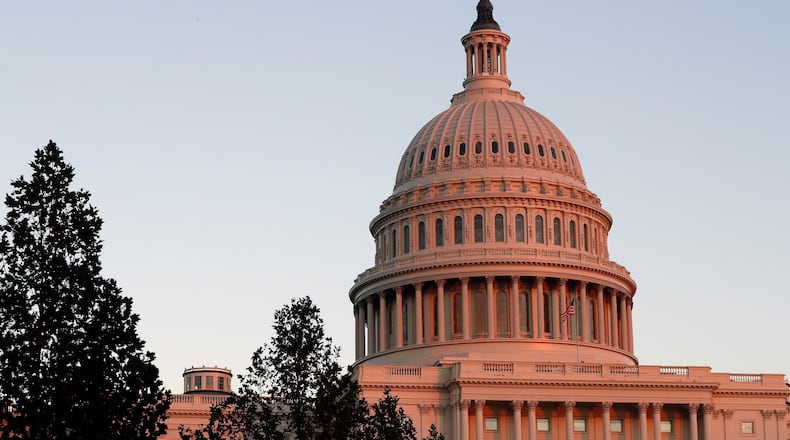Atlanta’s northern suburbs have played host to the nation’s most expensive congressional race and, most recently, its closest.
Originally drawn to be safe Republican seats, Georgia’s 6th and 7th congressional districts have transformed into the political front line as the parties scramble for suburban dominance in the era of President Donald Trump.
They’re almost certainly poised to return to the national forefront in 2020, and the attention is drawing the interest of several of the major players from last year’s congressional races. But those familiar faces will have company.
A free-for-all is forming in the 7th District, which covers parts of Gwinnett and Forsyth counties, now that incumbent Republican U.S. Rep. Rob Woodall is retiring. Democrat Carolyn Bourdeaux, who narrowly lost to Woodall in November, has already launched another campaign. More than a dozen potential candidates are also gauging a run.
In the 6th, a 2018 rematch is likely. Former Republican U.S. Rep. Karen Handel is quietly preparing to challenge Democrat U.S. Rep. Lucy McBath, but this time roles will be reversed. Not only does Handel come in as the challenger, but she’ll have to fend off at least one well-known GOP rival after avoiding any primary opposition last year.
The national political parties focused their attention elsewhere in the lead-up to last year's midterms. But the close outcomes in the Handel-McBath and Woodall-Bourdeaux contests, coupled with what's expected to be a high-octane U.S. Senate race, have put both districts high on political target lists for 2020.
“I expect metro Atlanta and Georgia, to an even greater degree, to be the political center of the universe once again,” said Howard Franklin, a Democratic strategist.
‘Busted through the door’
A ripple of applause greeted Stacey Abrams in Gwinnett County when she called last year’s election a “warmup act” to this year’s vote. That’s because the suburban county has fast transformed from a Republican stronghold to a must-win for Democrats that Abrams carried with 57 percent of the vote in the 2018 governor’s race.
Bourdeaux, a political newcomer and public policy professor, came within a hair of defeating Woodall in November with a health care-focused platform. She’s lined up big-name endorsements, and last week she announced she would run again, saying she is “coming back to finish the job.”
But this time, she’ll likely face at least one prominent Democrat who believes he or she can do better after Bourdeaux narrowly lost the race. Three potential competitors are state legislators who have their own political bases and diverse backgrounds.
There's state Rep. Pete Marin, one of the first Latinos elected to the General Assembly; state Rep. Brenda Lopez, the first Latina elected to the Legislature; and state Rep. Sam Park, the first openly gay man elected to the Legislature. Each said he or she will decide whether to run after the legislative session.
“Of course, any good elected official weighs all his options, especially when the political landscape has changed so significantly,” Marin said.
Party officials see a sea change from even a few years ago, when they struggled to recruit viable candidates to challenge Republican incumbents. Changing demographics in Gwinnett have fueled the shift, and a turning point came when Hillary Clinton narrowly carried the county in the 2016 presidential race, said Bianca Keaton, the chairwoman of the county’s Democratic Party.
“It challenged the narrative of Gwinnett being a red county. Our government had been pretty much all red, but our electorate hasn’t been,” she said. “Hillary kind of cracked the door a little bit. And these candidates busted through the door” in 2018.
A policy geek who loathed fundraising and other trappings of political campaigns, Woodall comfortably won re-election with 20-point margins until last year. His 433-vote margin of victory over Bourdeaux infuriated local Republicans and helped shape his decision not to run again in 2020.
Now more than a half-dozen Republicans are eyeing the seat, including state Sen. Renee Unterman, a former nurse and one of only two GOP women to serve in the chamber, and businessman Rick Desai, a leader in the Indian-American community and an ally of Gov. Brian Kemp's.
“I think the formula for the best candidate is somebody that can raise money and is willing to work hard to win this seat,” Gwinnett-based Republican strategist Julianne Thompson said. “Republicans can’t just sit back and relax and expect to win anymore.”
‘Win this seat back’
Republicans are just as eager to take on McBath, who defeated Handel in one of the biggest upsets of last year's election. Her victory came only 18 months after Handel bested Democrat Jon Ossoff in a special election that cost more than $60 million that the GOP celebrated as a triumph.
The Republican National Committee began singling out McBath even before she cast her first vote for Nancy Pelosi for U.S. House speaker, and it’s continued to up the pressure on her in the weeks since.
I’m “staying focused on what I need to stay focused on,” McBath said last month. “Whoever’s coming after me, they’re going to come after me anyway.”
Since November, Handel has kept a low profile, but she’s maintained close contact with donors and supporters and lined up endorsements from many of the area’s elected officials.
“She’s been overwhelmed by the encouragement and support she’s received since the election for her to run again,” said Rob Simms, Handel’s campaign strategist in 2017 and 2018. “And there are many people who believe she’s the best candidate to win this seat back.”
A handful of Republicans are weighing bids against her, and one — state Sen. Brandon Beach — has already jumped in. The Alpharetta executive aims to run in the mold of U.S. Sen. Johnny Isakson — that is to say, an establishment-friendly politician with a host of votes on conservative issues.
He's also carved out a reputation as one of the Legislature's leading voices on two issues: He has pushed for the legalization of casino gambling to boost the HOPE scholarship and, as chairman of the Senate Transportation Committee, sponsored a string of initiatives to expand mass transit.
“Public education, transportation and job creation — that’s what I’m good at. That’s what I bring to the table,” Beach said. “I can win this. The Democrats worked for years to win this seat, and they did. I’m going to start early and win it back.”
In 2017 and 2018, the 6th District contests became proxy fights over national figures such as Trump and Pelosi. With the president on the ballot next year and a stream of Democratic presidential contenders filtering through the state, it will be more difficult for congressional candidates to carve out their own identities.
And if outside money begins pouring in like it did during the 6th District special election, that could become virtually impossible. Woodall hinted at the same thing happening in the 7th during an interview shortly after he told his staff he would not stand for another term, saying he didn’t want his race to become a “giant circus.”
“It’s a big sacrifice that these men and women are taking on in order to serve,” he said, “and the more runway they get to make that decision, I think the better representative we’re going to get out of the district.”
Stay on top of what’s happening in Georgia government and politics at ajc.com/news/georgia-government/.
Keep Reading
The Latest
Featured



